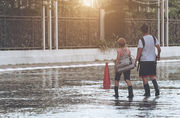September 11, 2001 marked a new chapter for the renegotiation of P&C reinsurance treaties. In the past, reinsurers had forecast that Canadian rates would rise by an average of 15% to 25%. The terrorist attacks changed everything. Much sharper increases are now on the horizon!
“It is clear that this catastrophe will reinforce reinsurers’ determination to increase their prices,” confirmed Brian Gray, Chairman and CEO of Swiss Re Canada.
Patrick Lacourte, Chief Agent at Partner Re Canada, sees the event as a major shot in the arm for reinsurers. “This atrocious and horrific tragedy will accelerate the financial recovery of the reinsurance industry because it will make the public aware of the importance of insurers’ increasing their prices.”
Mr. Lacourte admits that the crisis will deteriorate the capitalization of the insurance industry, especially in the U.S. “Reinsurers will experience difficulties for the next few years and will certainly post losses for 2001,” he said.
A reliable source who prefers to remain anonymous agrees that all reinsurers worldwide will be hit financially by this disaster, whether American or European. “Canada was lagging behind the rest of the world when it comes to prices. This catastrophe will significantly multiply the Canadian price increases which had already been projected for January 2002.”
Next year there will certainly be less capacity to reinsure the market, the source added. “Prices will rise accordingly. This will be particularly true of large commercial and industrial policies written in Canada but covering foreign markets. Those global policies cover Canadian customers even overseas.”
“These terrible events have prompted serious reflection on risk evaluation among reinsurers and their shareholders,” noted André Carignan, Senior Vice-President and Regional Director at AON-BEP. “Senior directors are now scrutinizing each market under a microscope before renewing treaties. You know, the World Trade Center will cost at least double that of hurricane Andrew, which had sparked a re-examination of disaster coverage.”
“Rates are not the only variables of the writing process that will be assessed,” said Henry Klecan, President of SCOR Canada. “It’s clear that reinsurers will evaluate risks differently. Industry habits will be thrown into turmoil because of this crisis.”
“The solutions to the reinsurance industry’s problems are multidimensional,” explained John Phelan, President of Munich Re Canada. “I don’t think that the reinsurers need the WTC to explain to their customers that they have to raise their rates. Instead, reinsurers will need to be much more selective in the way they cover risks.”
Mr. Carignan shares the opinion of Standard & Poor’s (S&P’s), expressed a few days after the attacks: the industry will not be destabilized by this crisis… if the bill remains below $50 billion US. During a conference call on September 26, the rating agency mentioned that above the $50 billion US mark, however, some insurers might be facing insolvency problems.
“This catastrophe will affect a good number of insurers, particularly those whose shareholders’ equity was stagnating or declining. But insurers are larger than reinsurers. They have a larger primary market, which will enable them to return to financial health more quickly than reinsurers. What worries me is that once these losses have been reimbursed, some reinsurers will be hurt more than others. Their shareholders will then be tempted to jump ship. If a reinsurer goes out of business or sells their portfolio, older unsettled claims may be affected, particularly with regard to settlement times.”
Nature of claims expected by insurers
• Property damage and civil liability of airline companies
• Property damage and civil liability of owners of WTC and neighbouring buildings.
• Damage and losses related to computer systems, furniture and office equipment, inventory and other property of the companies situated in the WTC and the surrounding buildings.
• Life insurance claims.
• Injuries insured by group plans that cover work-related accidents of employees working at the WTC, the Pentagon, surrounding buildings and emergency personnel.
• Claims related to vehicles damaged by debris from buildings, and to vehicles destroyed in underground parking lots.
• Losses related to business interruption of companies located in the WTC or in its security perimeter.
• Potential civil liability for insurers of the WTC and surrounding buildings if it is determined that worker evacuation did not take place promptly.
• Many of the personnel who escaped this disaster suffer from survivor’s guilt. Several employers will have to replace the staff suffering from depression, for whom it may take weeks or months to recover from the shock of the event. Ultimately, this variable will propel the invoice of insured losses upward.








